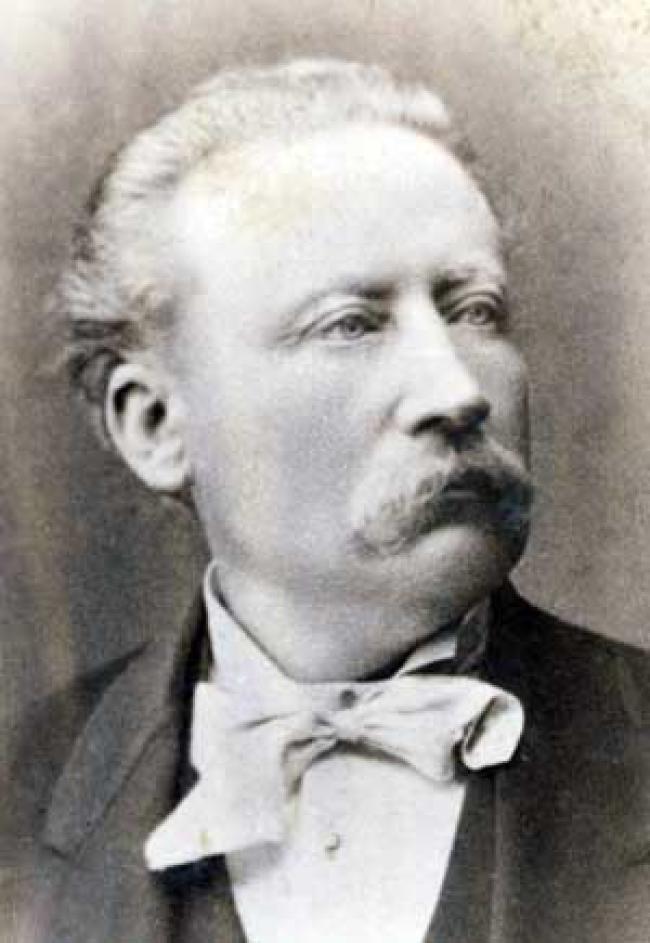Gustav Erik Stolpe
Professor of music, 1882-1893

(This series of Notable Faculty profiles was written in celebration Augustana's sesquicentennial in 2009.)
In 1882, Gustav Erik Stolpe was invited to become the first full-time faculty member in music at Augustana College and Theological Seminary. No one is quite sure why he accepted because Stolpe was a well-known musician in Sweden, accomplished in teaching, performance, and composition. He came from a long line of organists and had earned the degree of Music Director at the Royal Conservatory in Stockholm.
Among his stellar credentials was accompanying Jenny Lind on a tour of Sweden. Why would a successful artist in Sweden, at the age of 48, move from his beloved home country to an outpost in the middle west of America?
We can guess. For one thing, he was independent and emotionally tough. His mother died when he was 12; he played the organ at her funeral, including the funeral march that he composed for the occasion. Perhaps Gustav Stolpe had the grit and determination he would need to start a new life in America.
By the time he made a concert tour of the United States, in 1881, his wife Engel had died and his son Mauritz had already immigrated to America. Perhaps he felt that his family ties lay in the U.S. Most of all, the musician with a big personality and indefatigable energy, it seems, enjoyed a challenge, especially one where he was in control.
Stolpe would need all the energy he could muster to teach music at Augustana. In a typical week in the year 1886-87, he taught seven organ lessons, six violin lessons, and 10 vocal lessons, as well as classes in history and theory. He played organ, violin, and piano; accompanied students; joined trios and quintets; conducted various music groups; served as organist at the Moline Lutheran Church; and continued to compose, leaving at the time of his death a corpus of work that included 38 operettas, 25 orchestral works, 25 pieces for brass band, 25 piano solos, and more.
Stolpe's major contribution to the development of music at Augustana was his founding of the Conservatory in 1886. The numbers are staggering. When Stolpe joined the college faculty in 1882, only 25 students had graduated from the institution. The Conservatory began with 17 students in 1886. When Stolpe left the college seven years later, in 1893, the Conservatory enrolled 157 students. And his influence was marked. His students went on to teach at the college and at other Lutheran colleges around the country.
Stolpe resigned from the college in 1893 because of a disagreement with the administration over the merging of his Conservatory choir with the Oratorio Society. No doubt he was bruised by the experience and felt underappreciated. Perhaps he secretly exulted over the fact that it took a group of no less than five instructors to replace him. After a few years running a small music school in Rock Island, Stolpe moved to New York, then headed the music department at Upsala College in New Jersey where he died in 1901.
Fifteen years later, in 1916, Stolpe was honored in a memorial printed in the Augustana Bulletin written by a former student, Professor Adolf Hult of the Augustana Theological Seminary, who finally delivered the praise to Stolpe that he would have relished and that he deserved.
Hailing Stolpe as the "greatest church musician of the Augustana Synod," Hult goes on to suggest that Stolpe never quite meshed with the "Twin Cities" communities he inhabited: "He lived and died in our land as one of us, even if his European carriage, his transatlantic thoroughness, the Swedish gentleman-spirit of the noblest type, his culture worked into his character, even if this and yet more gave proof of the fact that he was not one of us."
In 1976, Sven Hansell wrote a paper about Stolpe. The subtitle reads: "The Most Significant Teacher, Composer and Performer Among Swedish-American Immigrants of the Midwest During the Late 19th Century." No doubt Gustav Stolpe would have liked this pronouncement as his epitaph.
